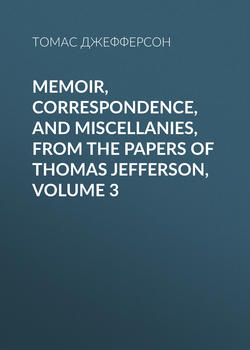Читать книгу Memoir, Correspondence, And Miscellanies, From The Papers Of Thomas Jefferson, Volume 3 - Томас Джефферсон, Thomas Jefferson - Страница 61
LETTER LX.—TO WILLIAM SHORT, April 25, 1791
ОглавлениеTO WILLIAM SHORT.
Philadelphia, April 25, 1791.
Dear Sir,
My late letters to you have been of the 8th, 12th, 15th, and
19th of March; yours received and acknowledged, are as follows,
******
I consider the consular convention as securing clearly our right to appoint Consuls in the French colonies. The words ‘Etats du roi’ unquestionably extend to all his dominions. If they had been merely synonymous with ‘la France,’ why was the alteration made? When I proposed that alteration, I explained my reasons, and it cannot be supposed I would offer a change of language, but for some matter of substance. Again, in the translation, it is ‘dominions of France.’ This translation was submitted to M. de Montmorin and M. de Reyneval, with a request that they would note any deviation in it from the original, or otherwise it would be considered as faithful. No part was objected to. M. de Reyneval says, we must decide by the instrument itself, and not by the explanations which took place. It is a rule, where expressions are susceptible of two meanings, to recur to other explanations. Good faith is in favor of this recurrence. However, in the present case, the expression does not admit of two constructions; it is co-extensive with the dominions of the King. I insist on this, only as a reservation of our right, and not with a view to exercise it, if it shall be inconvenient or disagreeable to the government of France. Only two appointments have as yet been made (Mr. Skipwith at Martinique and Guadaloupe, and Mr. Bourne in St. Dominique), and they shall be instructed not to ask a regular Exequatur. We certainly wish to press nothing on our friends, which shall be inconvenient. I shall hope that M. de Montmorin will order such attentions to be shown to those gentlemen as the patronage of commerce may call for, and may not be inconvenient to the government. These gentlemen are most pointedly instructed not to intermeddle, by word or deed, with political matters.
My letter of August, 1790, to Mr. Carmichael, was delivered to him by Colonel Humphreys.
The report you mention of the prospect of our captives at Algiers being liberated, has not taken its rise from any authoritative source. Unfortunately for us, there have been so many persons, who (from friendly or charitable motives, or to recommend themselves) have busied themselves about this redemption, as to excite great expectations in the captors, and render our countrymen in fact irredeemable. We have not a single operation on foot for that purpose, but what you know of, and the more all voluntary interpositions are discouraged, the better for our unhappy friends whom they are meant to serve.
You know how strongly we desire to pay off our whole debt to France, and that for this purpose, we will use our credit as far as it will hold good. You know, also, what may be the probability of our being able to borrow the whole sum. Under these dispositions and prospects, it would grieve us extremely to see our debt pass into the hands of speculators, and be subjected ourselves to the chicaneries and vexations of private avarice. We desire you, therefore, to dissuade the government, as far as you can prudently, from listening from any overtures of that kind, and as to the speculators themselves, whether native or foreign, to inform them, without reserve, that our government condemns their projects, and reserves to itself the right of paying nowhere but into the treasury of France, according to their contract.
I enclose you a copy of Mr. Grand’s note to me, stating the conditions on which Drost would come, and also a letter from the Secretary of the Treasury, expressing his ideas as to those terms, with which I agree. We leave to your agency the engaging and sending Mr. Drost as soon as possible, and to your discretion to fix the terms, rendering the allowance for expenses certain, which his first proposition leaves uncertain. Subsistence here costs about one third of what it does in Paris, to a housekeeper. In a lodging house, the highest price for a room and board is a dollar a day, for the master, and half that for the servant. These facts may enable you to settle the article of expenses reasonably. If Mr. Drost undertakes assaying, I should much rather confide it to him, than to any other person who can be sent. It is the most confidential operation in the whole business of coining. We should expect him to instruct a native in it. I think, too, he should be obliged to continue longer than a year, if it should be necessary for qualifying others to continue his operations. It is not important that he be here till November or December, but extremely desirable then. He may come as much sooner as he pleases.
We address to M. la Motte a small box for you, containing a complete set of the journals of the ancient Congress, the acts of the last session of the federal legislature, and a continuation of the newspapers.
I am, with great and sincere esteem, Dear Sir, your affectionate friend and humble servant,
Th: Jefferson.
